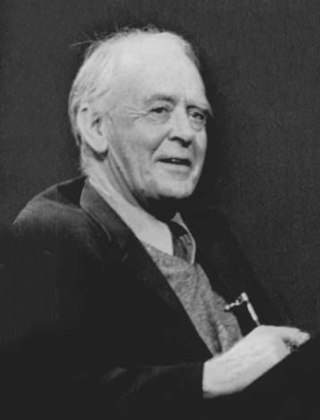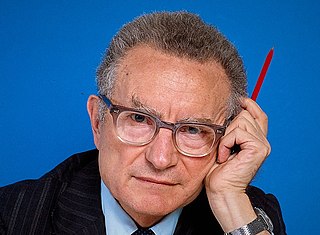Related Research Articles

Carl Menger von Wolfensgrün was an Austrian economist and the founder of the Austrian school of economics. Menger contributed to the development of the theories of marginalism and marginal utility, which rejected cost-of-production theory of value, such as developed by the classical economists such as Adam Smith and David Ricardo. As a departure from such, he would go on to call his resultant perspective, the subjective theory of value.

Economics is a social science that studies the production, distribution, and consumption of goods and services.

Robert Emerson Lucas Jr. was an American economist at the University of Chicago. Widely regarded as the central figure in the development of the new classical approach to macroeconomics, he received the Nobel Memorial Prize in Economic Sciences in 1995 "for having developed and applied the hypothesis of rational expectations, and thereby having transformed macroeconomic analysis and deepened our understanding of economic policy". N. Gregory Mankiw characterized him as "the most influential macroeconomist of the last quarter of the 20th century". In 2020, he ranked as the 10th most cited economist in the world.

Sir John Richard Hicks was a British economist. He is considered one of the most important and influential economists of the twentieth century. The most familiar of his many contributions in the field of economics were his statement of consumer demand theory in microeconomics, and the IS–LM model (1937), which summarised a Keynesian view of macroeconomics. His book Value and Capital (1939) significantly extended general-equilibrium and value theory. The compensated demand function is named the Hicksian demand function in memory of him.

Paul Anthony Samuelson was an American economist who was the first American to win the Nobel Memorial Prize in Economic Sciences. When awarding the prize in 1970, the Swedish Royal Academies stated that he "has done more than any other contemporary economist to raise the level of scientific analysis in economic theory".

John Ramsay McCulloch was a Scottish economist, author and editor, widely regarded as the leader of the Ricardian school of economists after the death of David Ricardo in 1823. He was appointed the first professor of political economy at University College London in 1828. He wrote extensively on economic policy, and was a pioneer in the collection, statistical analysis and publication of economic data.

William Jack Baumol was an American economist. He was a professor of economics at New York University, Academic Director of the Berkley Center for Entrepreneurship and Innovation, and Professor Emeritus at Princeton University. He was a prolific author of more than eighty books and several hundred journal articles. He is the namesake of the Baumol effect.
William Newmarch was an English banker, economist and statistician.
Henry Dunning Macleod was a Scottish economist and lawyer.

Anthony Patrick Leslie Minford is a British macroeconomist who is professor of applied economics at Cardiff Business School, Cardiff University, a position he has held since 1997. He was Edward Gonner Professor of Applied Economics at the University of Liverpool from 1976 to 1997. In 2016, Minford was a notable member of the Economists for Brexit group which, in opposition to the consensus view of economists, advocated the UK leaving the European Union and claimed large economic benefits, which did not occur.

Lawrence Henry White is an American economics professor at George Mason University who teaches graduate level monetary theory and policy. He is considered an authority on the history and theory of free banking. His writings support the abolition of the Federal Reserve System and the promotion of private and competitive banking.

Mainstream economics is the body of knowledge, theories, and models of economics, as taught by universities worldwide, that are generally accepted by economists as a basis for discussion. Also known as orthodox economics, it can be contrasted to heterodox economics, which encompasses various schools or approaches that are only accepted by a minority of economists.

Applied economics is the application of economic theory and econometrics in specific settings. As one of the two sets of fields of economics, it is typically characterized by the application of the core, i.e. economic theory and econometrics to address practical issues in a range of fields including demographic economics, labour economics, business economics, industrial organization, agricultural economics, development economics, education economics, engineering economics, financial economics, health economics, monetary economics, public economics, and economic history. From the perspective of economic development, the purpose of applied economics is to enhance the quality of business practices and national policy making.
David Ernest William Laidler is an English/Canadian economist who has been one of the foremost scholars of monetarism. He published major economics journal articles on the topic in the late 1960s and early 1970s. His book, The Demand for Money, was published in four editions from 1969 through 1993, initially setting forth the stability of the relationship between income and the demand for money and later taking into consideration the effects of legal, technological, and institutional changes on the demand for money. The book has been translated into French, Spanish, Italian, Japanese, and Chinese.

The Kinked-Demand curve theory is an economic theory regarding oligopoly and monopolistic competition. Kinked demand was an initial attempt to explain sticky prices.
New classical macroeconomics, sometimes simply called new classical economics, is a school of thought in macroeconomics that builds its analysis entirely on a neoclassical framework. Specifically, it emphasizes the importance of rigorous foundations based on microeconomics, especially rational expectations.
Don Patinkin was an American-born Israeli monetary economist, and the President of the Hebrew University of Jerusalem.
William Blake was an English classical economist who contributed to the early theory of purchasing power parity.
Robert Denis Collison Black, FBA, MRIA, published as R. D. C. Black and known personally as Bob Black, was an Irish economic historian. He was the Professor of Economics at Queen's University Belfast, from 1962 to 1985, and an expert on the history of Irish economic thought and on W. S. Jevons.
Michael John "Mike" Artis FBA was a British economist. A leading macroeconomist, his research encompassed monetary economics, fiscal policies, and European institutions and policies.